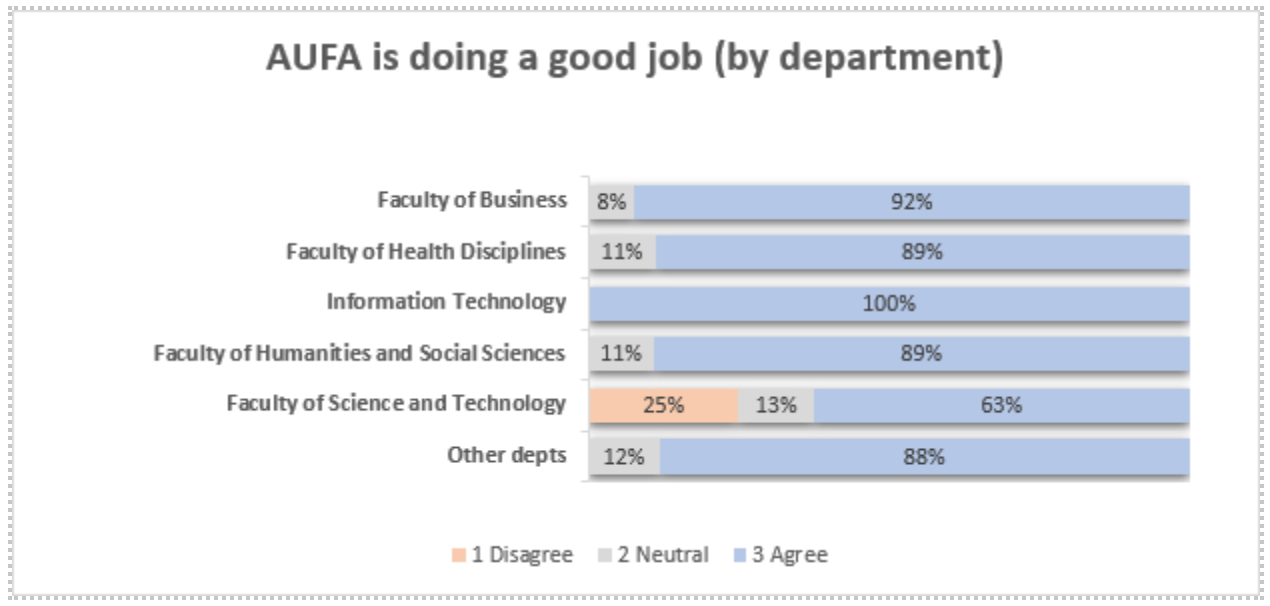Strike Support Rising—Member Survey
In late November, AUFA’s Membership Engagement Committee (MEC) completed its fifth telephone survey of members. Thirty-one volunteer callers contacted 102 randomly selected AUFA members (~23.5% of the membership). The resulting sample is broadly representative of our membership as a whole. This blog presents aggregated results. Key themes include:
AUFA enjoys broad support (90%).
Trust in the university executive is low (15%).
Members want a reasonable wage increase to offset inflation.
Member solidarity is high and there is growing support for a strike.
Climate Questions
Survey callers asked three recurring and one new climate question. Overall, there were no major differences between the views of professional and academic members. The new question (about morale) addresses comments in past surveys that members often enjoy their job (thus enjoy starting work in the morning) but are frustrated with working at AU.
Overall, 39% of members agree that their morale is high while 34% indicate it is low. This is significantly different than the 75% of members who indicate they enjoy starting work in the morning. Comments associated with these questions suggest that many members enjoy the work they do. However, they find the context in which they do that work very frustrating. A number of members noted that they have intentionally reduced their university service work in order to reduce their frustration. This new morale question appears to generate a more nuanced assessment of where the membership is at and will be retained going forward.
When asked if they trust the executive team of the university, 15% of respondents said yes while 58% said no. These results are similar to the April 2021 survey, where 16% of respondents indicated they trust the executive and 63% indicated they did not. It appears the departure of Neil Fassina has arrested the freefall in member trust but the executive has not been able to repair the damage.
Respondent comments identified several issues driving ongoing mistrust of AU’s executive. These include efforts to bust the union through de-designation, continuing problems with the IT re-organization, lack of any meaningful progress at the bargaining table, unmanageable workloads, pay inequity, the sneaky withdrawal of market supplements, executive invisibility, and insincere communications.
One member’s comments (paraphrased by the interviewer) provide a representative view of the AU executive:
The pandemic has been incredibly difficult and the actions of the AU executive team during this time have been cruel. They appear to operate with a total disregard for university employees, in fact they seem to operate with a disregard for what makes AU a good place to work and a good university. I have little faith that they make decisions with the interests of faculty, staff, and students in mind. It has become difficult to hope that the future of the university will be a good one. Their detached, non-transparent, and hostile-to-consultation style of leadership is likely to be disastrous for the university.
A very small number of members hope a new president will change the executive’s behaviour. It is difficult to imagine how the current executive can turn matters around and a top-to-bottom executive “house cleaning” may be the best option.
When asked whether AUFA was doing a good job, 90% of members agreed; only 2% disagreed. This is broadly similar to the April 2021 survey, where 93% of respondents indicated AUFA was doing a good job and 2% disagreed.
Bargaining Questions
The survey asked several questions about bargaining. The full results have been provided to the bargaining team to inform their approach at the table going forward. Significantly, there has been a notable increase in member willingness to strike. In April 2021, 69% of members said they would strike to avoid a 4% rollback. In this survey, 96% of members said they would strike to avoid any rollback.
Members were asked what their highest priority change to the collective agreement was. By far, the most common answer was a raise to address inflation. AUFA members have not had a raise in salary grids in four years. Job security was also ranked as a priority, although notably less so.
With the employer yet to table a full proposal (i.e., monetary plus full language on a number of items are still missing), there is a chance that AU may attempt some wedge tactics. To gauge the effectiveness of this potential approach, members were asked about their willingness to accept an employer offer that provided them with a small gain but only if they agreed to a rollback that would harm other members.
Respondents overwhelming (81%) rejected such wedge tactics, with only 1% indicating they would accept such an offer.
What this survey suggests is that wedge tactics would not be an effective approach for AU. This high level of member resistance to wedge tactics is likely influenced by AU’s efforts in 2020 to de-designate large portions of the AUFA membership. This cynical move only strengthened member solidarity.
Members were also asked whether they had any concerns or questions about a possible work stoppage. These items have been passed along to the AUFA Job Action Committee for discussion. In the meantime, members with questions about a possible work stoppage are encouraged to consult the following resources on the AUFA website:
Finally, the survey asked members questions about equity issues at AU. These results will be passed along to the AUFA Equity Committee for discussion. Members’ responses will also be shared as part of AUFA’s external equity audit. More information about this audit process (including how to get involved) will be shared in the new year.
MEC very much appreciates the work of the 31 volunteer callers, who made this survey the easiest to conduct yet. MEC also appreciates the 102 AUFA members who took the time to speak with the callers and help AUFA’s various committees understand the views and needs of AUFA members.
Rhiannon Rutherford, Chair
AUFA Membership Engagement Committee






